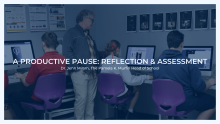
Head’s Message by Dr. Jenn Milam
As we find ourselves firmly planted in October with fall weather approaching, we have also reached the end of the first quarter for Lower and Middle School, and Upper School is wrapping up mid-term assessments, projects, and units of instruction. And just as the fall season invites a shift and slower pace in the natural world, it can be a time for us to pause and reflect, with our students, on how the school year is progressing in relation to not just their academic progress, but also social, emotional, and community well-being.
The end of a grading period - even if just a progress report - can bring feelings of worry, anxiety, pressure, and/or frustration. While I want to acknowledge those feelings and also urge you, as parents and caregivers of young people to do the same, I’d like to encourage you to help your students shift to a more productive, affirming, growth-oriented mindset. All too often, our young people see their course grade as a destination - a full, summative comment on who they are as a learner and a person. And the truth is, that a grade is simply a measure of progress at a designated moment in time. It is a measure of effort, of understanding, of meeting course expectations, to that date.
As you receive your student’s first grade card or progress report, I invite you to take time to engage in a dialogue with your young person about those grades, and what they might be offering as insight into their successes and areas that may require adjustment and refocus.
Rather than reward, reflect on the process
If your student is doing well in school and earning high marks, rather than pouring on praise with compliments like “You’re so smart,” I like to encourage parents to facilitate a conversation about how those successes happened. Help your young person recognize that reaching those goals took organization, focus, effort, and persistence. Good things don’t just happen - positive outcomes are the product of preparation and practice. When you praise the practices that enable success, you focus more on the process than the product. And more so, you nurture in a young person the ability to develop skills and dispositions that lead to success, rather than framing success as check-boxes next to a list of assignments to be completed and graded.
Don’t punish, offer support
If your student is not performing to the degree to which you believe they are capable, this, too, is an opportunity to have a meaningful conversation about what might need to be changed, adjusted, or revised to enable success. Does your student have a designated homework space at which to work? Do they have a predictable and manageable schedule to balance after school activities, family time, and their academic work? Have you talked about strategies like tackling the hardest task first, breaking big projects into smaller tasks, or studying further ahead of major assessments? Because we’ve all been removed from school for some time, it’s easy to forget that these skills do not just happen - they are taught, learned, practiced, and become habits. And while we teach these at school, too, it is helpful for you to support and reinforce this at home.
Learning is hard, but we can do hard things
One of my favorite neuroscientists of all time, Dr. Jared Cooney Horvath, said two things that are very powerful:
- Learning happens by practicing. Lots of repetitive, intentional, practice.
- Learning is hard work, and often, it doesn’t feel good.
We are often misguided in our quest to make everything “enjoyable” for our young people, and we miss opportunities to teach resilience and growth when we do that. My mentors used to tell me, “Anything worth doing is worth doing well,” and doing that thing well was often not easy. But the feeling of accomplishment and self-assuredness that came as a result of realizing my goal, was priceless. As a result, I learned confidence in myself and in my ability to tackle, with that confidence, anything that came my way.
As you receive progress reports and grades, spend time in Parent-Teacher Conferences, or review your student’s mid-term progress report, remember that it is not a destination - but a pitstop on a journey. This is a chance to check the oil, gather some snacks, and double check the best route. You might need to change drivers, adjust the seats, or even take a different road. No two learning paths are the same, but a growth mindset and supportive adults can make all the difference in the world to a young person developing skills and figuring out who they are as a learner.

.png&command_2=resize&height_2=85)
.png&command_2=resize&height_2=85)

%20(1).png&command_2=resize&height_2=85)

.png&command_2=resize&height_2=85)
%20(1).png&command_2=resize&height_2=85)

.png&command_2=resize&height_2=85)

.png&command_2=resize&height_2=85)






.png&command_2=resize&height_2=85)
